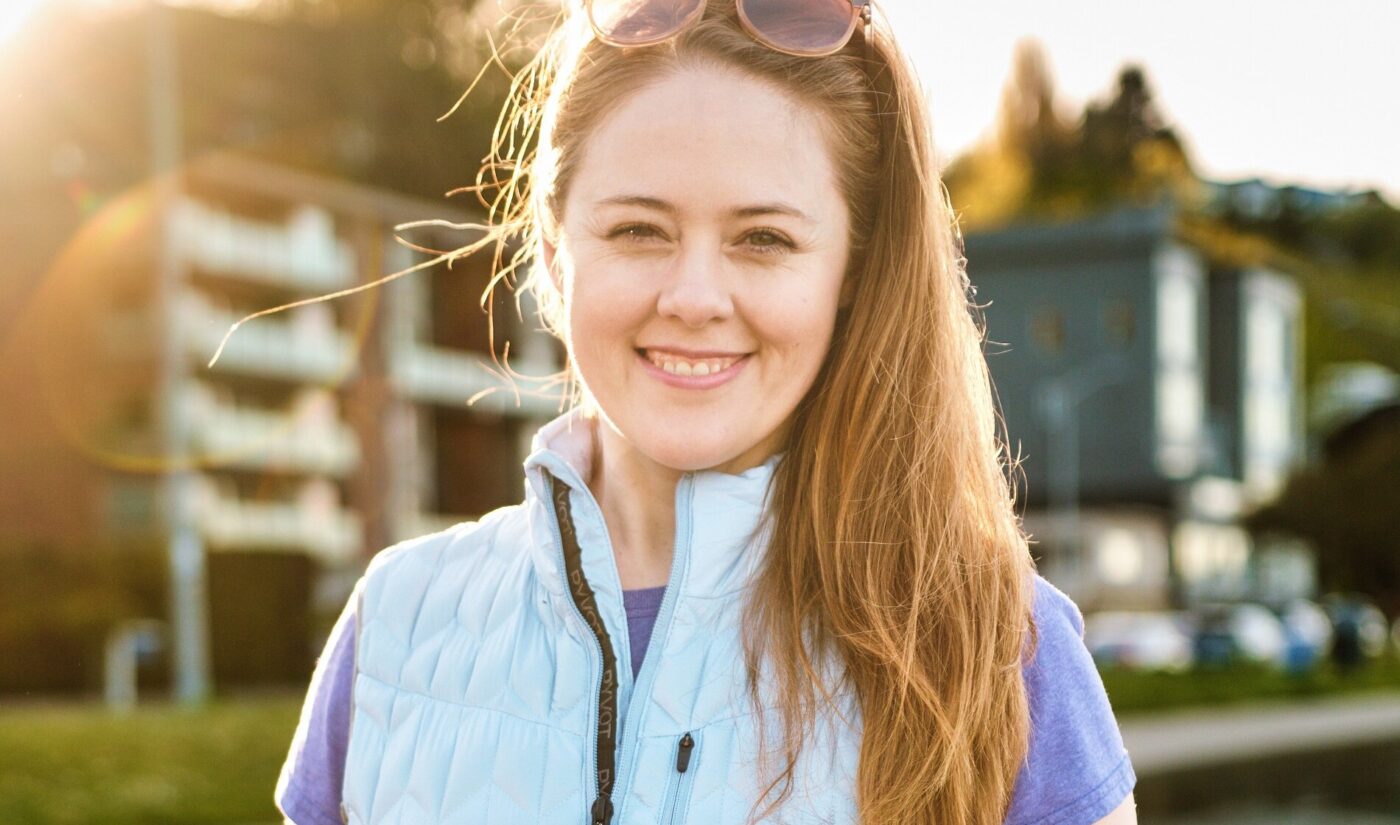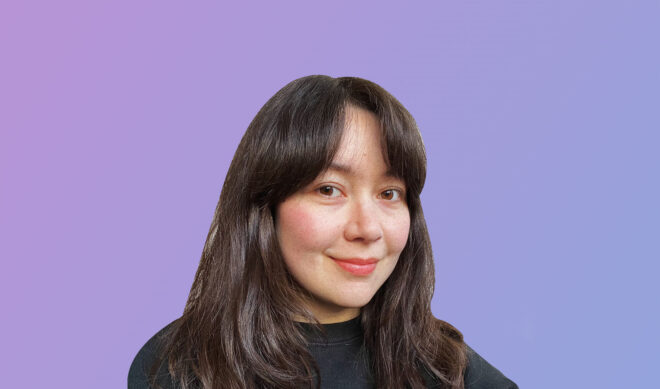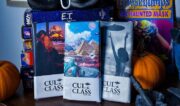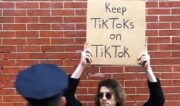Welcome to Creators on the Rise, where we find and profile breakout creators who are in the midst of extraordinary growth. You can check out previous installments here.
Growing up, Jessica McCabe knew something about her was different.
“I was the kid staring dreamily out the window and getting lost in books and in my own world, scattered, and came home without my jacket all the time,” she says. “But I wasn’t really a troublemaker.”

Subscribe to get the latest creator news
That last bit was key: it’s why she didn’t get diagnosed with ADHD, which at the time was stereotyped as something “for boys” that would “only” manifest in bad behavior and bounce-off-the-walls hyperactivity, until she was 12. That year, her mother was in a serious car accident that left her badly injured. Her being in recovery meant McCabe was very suddenly on her own with handling things like homework.
“With her just incapacitated and the extra demands of even middle school of getting myself to classes on time, remembering my locker combination, and being responsible for doing my homework without anybody giving me stickers, that was tough,” she says. She’d hit a wall where her executive dysfunction was overcoming her coping strategies and fully debilitating her, and it was frustrating. “I was a gifted kid, wasn’t I supposed to be successful?” she says. “Everybody kept telling me how much potential I had, and I clearly had not reached it–and not for lack of trying.”
That frustration continued into adulthood. As an adult, McCabe was doing everything right. She had a job–or sometimes two, or three, or four jobs–and was pursuing her true passion, acting, while also putting herself through massage therapy school. These were all things she’d been told were “right.” Were “correct.” Things that would get her where she needed to go.
“I felt like I was doing so much to try and quote-unquote ‘be successful’ and reach my potential and do all these things that people expected of me,” she says. “But I felt like no matter how hard I tried, I was falling farther and farther behind my peers.”
She was exhausted. She didn’t know why the things that seemed to work for everyone else weren’t working for her.
All she did know was that she had ADHD. But she’d never really learned what that meant, or what she could do to help mitigate her symptoms in addition to medication.
“I was like, okay, let me look into this. Let me learn what I can about ADHD and put everything that I learned somewhere, so I could find it again,” she says. “And the only thing I knew I wouldn’t lose, because I lose everything–I lose notebooks, I lose my phone, I lose, like my mom used to joke that I’d lose my head if it wasn’t attached–but I knew I wouldn’t lose YouTube. So I decided to essentially use YouTube as my binder. Every week I learned something new.”
And every week, people began tuning into her videos.
Now, years later, McCabe’s channel How to ADHD has more than 1.6 million subscribers, and she’s just released her first book, How to ADHD: An Insider’s Guide to Working with Your Brain (Not Against It), with Penguin Random House.
Check out our chat with her below.
This interview has been edited for length and clarity.
Tubefilter: I’m so excited to talk to you. I also have ADHD, and have watched your videos for quite a while. I would love to start with, imagine somebody’s reading this and they don’t know who you are, give me a little bit of introduction about you, where you’re from, and your life before you started making YouTube videos.
Jessica McCabe: I’m the creator/host of the YouTube channel How to ADHD, and I have a whole team. I’ve written a book, but I started out just failing at life pretty hard, actually, that’s how I got my start with YouTube. I was 31 years old and broke, divorced. My credit was terrible. I was living at home with my mom and going, “Wait a second, I was a gifted kid. Wasn’t I supposed to be successful?” Everybody kept telling me how much potential I had, and I clearly have not reached it–and not for lack of trying.
I had worked so hard. I’d worked two, three jobs, or I’d be working one job while trying to pursue an acting career while trying to put myself through massage therapy school. I felt like I was doing so much to try and “be successful,” reach my potential, and do all these things that people expected of me, but I felt like no matter how hard I tried, I was falling farther and farther behind my peers.
I’d gotten married, but I’d gotten divorced within a year. Yes, I realized I was at the point where I was no longer somebody with so much potential. I was quickly becoming somebody who hadn’t reached it. At the same time, I was exhausted. I hit burnout and was like, “I can’t give more. I don’t know how I’m going to get to this place that everybody expects me to be at if what I’m already doing isn’t working because I’m exhausted. I can’t even keep this up.”
I decided to look into what was going on with that. The only clue that I had really was that I’d been diagnosed with this thing called ADD, and I knew I got distracted. I had this medication that helped me with that, but maybe there was more to it because every once in a while, I’d come across an article with a strategy or something that had helped me for a week until I forgot about it or couldn’t find it again, so I decided to look into what I was struggling with.
Maybe instead of trying to put so much effort into trying to be successful and get ahead and reach my potential, maybe I could put that amount of effort into figuring out what was getting in my way and what to do about it, and maybe that would make a difference. That was the only clue I had. I had this diagnosis, so I was like, “Okay, let me look into this. Let me learn what I can about ADD and put everything that I learned somewhere I could find it again.”
The only thing I knew I wouldn’t lose because I lose everything, I lose notebooks, I lose my phone. My mom used to joke that I’d lose my head if it wasn’t attached, but I knew I wouldn’t lose YouTube, so I decided to essentially use YouTube as my binder. Every week I learned something new about what I found out was now called ADHD and I would put it on YouTube, so I could actually find it again. I made the videos public in case they were helpful for anybody else, which it turns out they were.
Tubefilter: When were you diagnosed?
Jessica McCabe: I was actually diagnosed at age 12. Yes, which was pretty young. It was 1994, so that was a big deal for a girl to get diagnosed back then. I definitely fit more of the traditionally female presenting stereotype of ADHD. I was the kid staring dreamily out the window and getting lost in books and in my own world, scattered, and came home without my jacket all the time, but I wasn’t really a troublemaker.
I didn’t really act out until middle school because we had some trauma in my family. My mom got in a really bad car accident with a drunk driver, it was a head-on collision. It killed two of her friends and it left her badly injured. We had to change schools. We swapped out our couch for a hospital bed. There was just so much going on plus the hormones, puberty, all of that.
Suddenly, this very introverted internalized presentation, I suddenly started acting out and that caught my mom’s attention. Right around then my cousin was diagnosed. His mom ended up being diagnosed as well. My mom looked at me and was like, “You’re a lot like your aunt. Let’s get you checked out.” I was diagnosed when I was 12, but it was 20 years of going to doctors getting medication, sometimes not being able to go to doctors or get my medication because I didn’t have insurance or I forgot to schedule them or whatever, so it was a little intermittent, but it was 20 years of that before I was like, “Maybe there’s something more to this,” and I actually started to learn about what my diagnosis meant.
Tubefilter: Yes, I feel like the gifted kid pipeline definitely present. I definitely hit a wall in college where I was like, suddenly, writing my final papers the day they’re due is not going to work for me anymore. You always hit the wall.
Jessica McCabe: Yes, that happens a lot with people with ADHD. At some point, the demands on your executive function overwhelm your ability to cope, and for me, that just happened a little bit sooner because my mom was the support for my executive function. With her just incapacitated and the extra demands of even middle school of getting myself to classes on time, remembering my locker combination, and being responsible for doing my homework without anybody giving me stickers, that was tough.
That’s the point at which it overwhelmed me, but yes, some people it happens at college, some people it happens when they have their first kid. It seems to be different for everybody, but at some point, it’s like, “Okay, all of the stuff you used to be able to pull off at the last minute because you’re gifted or you used to be able to do okay on the tests or whatever, it’s not enough anymore.”
Tubefilter: Yes, that wall is the biggest. I think the biggest point for me and my other friends I’ve spoken to with ADHD. It’s life-collapsing. It’s awful.
Jessica McCabe: Yes, suddenly your coping strategies just aren’t enough anymore and everything starts to fall apart. There’s a quick downward spiral a lot of the time.
Tubefilter: Yes, sure is. When did you realize that other people were finding your videos helpful?
Jessica McCabe: Surprisingly quickly. I got pretty good feedback from the beginning, people saying, “Oh, my gosh, I didn’t know that,” or, “Wow, this is really helpful,” and that was encouraging, but I was still pretty sure that I wasn’t supposed to be doing what I was doing. I’m like, “I don’t have a degree in this. I dropped out of community college. I should not be talking about mental health on the internet. Who am I to do this, right?”
I was really glad to see that it was almost immediately helpful for other people with ADHD, but I just really hoped that nobody who actually knew what they were doing would find out what I was doing and tell me to take it down. It was a good six, eight months before I realized that it wasn’t just people with ADHD that were sharing my videos or finding them helpful. It was experts as well.
CHADD, the Children and Adults with ADD/ADHD, that’s a really big organization and they started sharing my videos. That’s the point where I knew, “Okay, this is not only helpful, but it’s okay that I’m doing it. I’m going to keep doing this.”
Tubefilter: Did this essentially become your full-time job after that?
Jessica McCabe: Not immediately. Sort of, but I also had another job. I waited tables. At first, I was determined not to ever take money from anybody for this because I’ve been broke and I knew that there was some help out there for people with ADHD. I knew that ADHD coaches were a thing vaguely, somebody had mentioned it to me once, but I couldn’t afford that, so I wanted to make all of the content that I created available to anybody, even people who are broke because those are the people who I felt needed it most, I definitely did.
I tried to do it for free for a really long time I still do make my content available for free, but I eventually did sign up for Patreon because what ended up happening was as I got better at understanding research and doing that research and my videos got better and better in terms of the quality of the information, I realized this was quickly becoming a full-time job, trying to keep up with answering people’s comments and doing all the research and writing and recording and filming, and being there for the editing process.
It was a lot. I was doing that on top of waiting tables. I ended up having to take a bunch of days off work to try and finish things and stay on top of it, but it got to the point where I realized I can’t keep doing this without support. I need to be able to cover the income from the days that I’m losing as a server, and eventually I would like to do this full-time.
I pushed really, really hard to get to the point where I could support myself full-time from the support we were getting on Patreon. That was a wonderful moment when I was able to tell my day job, like, “Hey, you guys have been great. Thank you for supporting this venture and being flexible enough that I could do both, but I need to focus on this full-time.”
Tubefilter: That’s a huge moment. Very cool.
Jessica McCabe: Yes, it was awesome.
Tubefilter: You mentioned that you have a team around you now.
Jessica McCabe: I do.
Tubefilter: I’d like to hear a little bit more about the people you work with.
Jessica McCabe: Yes. My team currently is absolutely wonderful. I have somebody who helps me with operations, day-to-day operations stuff, project management, payroll, and paying taxes. Basically, most of her job is making sure I don’t go to jail. [laughs] I’m a creator. I know how to create, but all the business side of things is really complicated and I don’t love it. I have support with that.
She also built out our website. If you go to any of our websites, howtoadhd.com or howtoadhdbook.com, she built those. She’s fantastic. We have a community manager who volunteered for us for a while. At some point, I was like, “Hey, you’re amazing and you should get paid for this.” We hired on a community manager who manages our Discord through Patreon as well as helps me respond to comments and emails and things like that.
Our lead producer, his name is Eddie. He works on every single video project that we do right now, as well as leads a team of– we have a couple of freelance editors as well. I also have writing support and research support. If I need help with writing, I have a writing buddy. If I need help with research, I have a research consultant. He’s actually why we have a badge on our channel that says that there’s a mental health professional because he is a psychologist.
Tubefilter: Oh, very cool.
Jessica McCabe: He helps with research. He pulls research for anything that I need research support on. He reviews every single video to make sure that the information we’re putting out is accurate.
Tubefilter: How long does the average video take for you to produce from conception to upload?
Jessica McCabe: It really depends on the type of video. The really research-based videos that I love digging my teeth into, and we script, we animate, we fully edit, the whole production, that can be anywhere from 8 to 12 weeks. Patrick can pull research, or we have another research consultant that we work with occasionally, her name is Farrah, she’ll sometimes go dig through research and provide me with a summary.
That’s a whole process. I have to come up with an idea, “Hey, let’s look into…” ADHD and women is one that she helped with. “Let’s do an episode on ADHD and women, and see what research says about how it presents differently, how it’s diagnosed differently, and things like that.” We had to go through a lot for that. I had to come up with the idea, let Farrah know, let’s pull research. Let’s see what research is out there on 18 women, ADHD, also on trans women or non-binary people, anything like that.
There wasn’t a lot of research for that. We had to focus on ADHD and women because that’s just where the research is right now. She went and pulled the research. I went through it, we met, talked, so that probably took a couple of weeks. Then I had to do the scripting process and that took probably another one to two weeks because there were a lot of nuances that I wanted to make sure that I got right.
I’ll often do an initial brain dump, write, rewrite, rewrite, polish, run it by the researchers, run it by experts if I can, and then I shoot. From there, it takes another four to six weeks for animation. It’s, all told, usually eight to 12 weeks for a video like that. For a vlog, that’s a lot easier, which is why there’s a lot more vlogs on my channel right now because while I was writing the book, all of my science communication really went into the book.
Tubefilter: I would love to hear about the book. I know you did a deal with Random House, which is huge. When did the idea of writing a book come to you?
Jessica McCabe: I’ve wanted to write a book my entire life. I didn’t know what I was going to write about, but when I was in high school, I was like, “I’m a gifted student. I love to read.” My reading comprehension was really high. I loved to read. I wanted to be a published author by the time I was 15.
That did not happen. I was a little bit late to that party, but I was approached by a publisher maybe four years ago or so, and I really wish that I could have done it then, but just the advance wasn’t big enough. I knew that I literally couldn’t afford to write that book because I would have had to take so much time away from my channel. I would’ve needed support with the writing process. I would’ve needed to pay a team. It actually wasn’t feasible for me to do at that point.
Penguin approached me a little over two years ago now and asked me if I wanted to do a book, and I’d already been thinking about the book that I wanted to write. I was like, “Yes, this is what I want to do.” They said, “Great.” I was like, “Really? You’re just going to let me do that?” They said, “Yes, this sounds great.” I was like, “Okay. That was easier than I thought. All right.”
The actual writing process was a lot harder than I thought. Getting the book deal was actually great. They approached me. That’s one of the great things about being a YouTuber, being a content creator is sometimes you get approached. I didn’t have to write the book proposal or anything. I got to start writing, which was its own challenge because I hadn’t written the book proposal. I had this great idea of what this book could be, but there was no reality check involved.
There was no, “Okay, but what would that look like? Let’s do a sample chapter.” There was no having to prove myself. I was just like, “I have this really great idea.” They were like, “Great, do it.” They were like, “Okay, great. Wait, how? Shoot. I didn’t really think that part through.”
Tubefilter: Which I think is a very ADHD thing, to be like, “I have this great idea!” Then other people are like, “Yes, you sound so enthusiastic! You sound so confident! You know what you’re talking about!” Then it’s like, “Great. Now what?”
Jessica McCabe: That was exactly it. I ended up emailing my editor and I knew that there was this thing called comps, comparable books. I was like, “Hey, you know what, just to make sure we’re on the same page, why don’t you send over some comps, so I know that we’re on the same page with what kind of book you’re expecting me to write here?” She was like, “No, I don’t think you need it. You got this.”
Tubefilter: Oh god.
Jessica McCabe: It’s like, “You know what you’re doing.” There’s a little bit of like, “Oh, no, she thinks that I know what I’m doing. Shoot.” It ended up being a really good thing because then I was able to stick to my original vision. I had to figure out how to translate that into something that was actually written on a page because it was more conceptual than anything else at the beginning.
Tubefilter: How long did it take you to write from start to finish?
Jessica McCabe: I was supposed to take a year. I took 14 months to write and then I took an extra month past what I was supposed to do for editing as well. All told, I was about three months over what I was supposed to do.
Tubefilter: That’s not bad at all. In the publishing industry, that’s not bad at all.
Jessica McCabe: I think that was about the limit, though, because toward the end, they were like, “Okay, we cannot give you any more extensions.” I was like, “Okay, ADHD, hyperfocus, go.” Just 16 hours a day, writing and rewriting and rewriting and rewriting. It was pretty intense toward the end. I think it is because they didn’t want to push the publish date. They wanted to be able to keep the date of January because there are actually a lot of books coming out now about ADHD, which is great. It was a bit intense toward the end.
Tubefilter: It’s out in January. Do you have any events planned or anything you’re planning to do around the launch?
Jessica McCabe: Yes, I’m actually really excited. Elliott Bay Books is a local bookstore that’s fantastic and also very ADHD-friendly because they’re open late. I get to go do a– what is it called? Oh, my gosh. I feel like I should know this. The book signing, that’s the word. I’m dealing with ADHD and pregnancy brain right now.
Tubefilter: Oh no. The wombo combo.
Jessica McCabe: Yes, it’s real fun. Words that I know are just gone temporarily. I’m doing a book signing at Elliott Bay on January 4th, which I’m super excited about. We’re still working on lining up book signings in other cities, possibly. It depends on how my pregnancy is going and if I can fly.
Tubefilter: In terms of your online audience being able to connect with your book, have you thought about doing any YouTube readings or livestreams or anything of that nature?
Jessica McCabe: Yes! Actually, we already did a virtual book signing. We might do another one. That was really, really cool, where I got to hang out and do a live stream on TalkShopLive and hang out with my community and answer questions and sign– well, attempt to sign bookplates. It turned out really quickly, like, “I’m going to sign these later,” because it was really tough to keep up with the chat and connect with the community at the same time as trying to sign bookplates, it turns out.
That was a really fun event. We do have a pre-ordered thing that’s also through the first week of sales where people can join a private live stream where it’s like a book club. It’ll be a few weeks after the book comes out. We’re going to just hang out and talk about the book and answer questions and things like that. I have a video coming out the day of the book launch, which is January 2nd about why it’s important, I think, when you have ADHD to set really big, fiery, ambitious goals and not realistic ones because I think we get bored of the realistic ones.
Also, we face all the same challenges. We need something exciting enough for us to push past them, quite frankly. There were so many challenges in writing this book that if I wasn’t writing the ridiculously ambitious book that I wanted to write, I don’t know if I would’ve been able to tackle the challenges the same way and get through it, a lot of my excitement for the ridiculous thing I was trying to do, and the challenge of it.
Nobody’s ever done a book like this before. I’m going to pack all of the things in. There were definitely more realistic things that I could’ve tried to do with this book, and not cramming all of the information about ADHD into one book would probably have been easier, but I don’t know if it would’ve been as exciting to me or as challenging or as motivating.
I have a video about that coming out. I’m probably going to do some fun things like go to random coffee shops and hang out and read my book and write a little note for somebody, put the note in the book, and then just let people know on social media, “Hey, I left a book here. Whoever wants to come get it can get it.” That’ll be fun too. Just some playful things with the community.
Tubefilter: Any other plans or goals for the next six months or a year or so? Aside from having your baby, which is very important. Anything else you’re up to?
Jessica McCabe: Yes, I’m trying to plan for maternity leave, which as a content creator is a really interesting challenge, especially because we’ve got the book launch too. I’m trying to do all the things for a book launch, which is more content and more interviews and such than usual. On top of that, there’s the holidays. On top of that, I’m trying to plan content for while I’m gone on maternity leave.
We’ll see how that goes. I feel like a lot of content creators know it’s really hard to step away even for a weekend, much less like eight weeks or 12 weeks or however long I do maternity leave for. That’s the big thing, but I think in terms of goals, what I want to do now for the channel is get other diverse voices on it because this was always meant to be How to ADHD, not How Jessica McCabe Became ADHD.
I would love to get more different hosts on, with a diversity of experience, a diversity of expertise, who can speak to challenges that I personally don’t face, like somebody with dyslexia talking about how they navigate that, or somebody with different jobs with different challenges, talking about how they navigate it. I think that would be really cool. That’s a big goal for later in the year.
I think at first, my team just needs a little time to recover. It’s been really intense. Just getting back to the sci-comm stuff, the really cool lecture-style videos, I miss getting to script out my videos. It’s been really fun to connect with the community on a different level with the vlogs and be more authentically just me, but I’m excited to get back into the research because that’s what I do, right.
I love being a science communicator, so I want to get back into that and talk about ADHD and anxiety, emotional impulsivity, ADHD and hormones, how hormones impact the experience of ADHD, ADHD nutrition. There’s a bunch of topics I’ve been wanting to tackle. I haven’t had time to just because I’ve been putting all my energy into the book.
Tubefilter: Perfect. It’s a lot of character development to go from, “Maybe I don’t deserve to be talking about this on YouTube,” to referring to yourself as a science communicator. That’s great.
Jessica McCabe: Yes, I’ve grown a little bit. I didn’t know I was a science communicator until I went to a talk. Her name’s Kara and she’s one of the writers on The Skeptics’ Guide to the Universe. She talked about being a science communicator and what that’s like. I looked at her and I went, “Oh, my god, I think that’s what I do. I think I’m a science communicator.” I went to a sci-comm camp and I learned a little bit more. I got their book and devoured that. I was like, “Yes, that’s what I do. I didn’t know that that’s what I did, but apparently, that’s what I do.” Yes, it’s been fun. I feel like a lot of content creators, you figure it out as you go.
Tubefilter: Yes. Oh, definitely. It’s very funny. “I think that’s my job!”
Jessica McCabe: It was the same thing with peer support. At some point, I found out that there’s this thing called peer support, or a peer and peer support training. I was like, “I think that’s what I do too. I’m a peer. I’m somebody who has these struggles supporting other people with these struggles. I should go learn how to do that.” I went and took a peer support training class as well.
Tubefilter: Is there anything else you want people to know about you? I know we talked a little bit about your projects, your goals for next year, but anything else you’re up to?
Jessica McCabe: Hmm. What else am I up to? I don’t know. It might be a little too early to talk about it, but there’s a secret project. I am starting a second channel. I’ll tell you. I’m starting a second channel called The Wandering Brain. It’s all about experiential stuff. I’ve got my classroom. How to ADHD is me educating people about how their brain works and how to work with their brain, not against it. I’m at the point where I’ve built up such a great toolbox that I’m ready to go out and just use it now. I want to just go live my life and do all the things that I don’t feel like I got to do because I was either struggling or trying to learn about my struggles. I just want to go out into the world as somebody with ADHD with this toolbox and go live my life.
We started a second channel that is going to be starting hopefully soon. We’ve already shot a bunch of stuff where I go and learn glassblowing or I go waterfall repelling. I get to go do things and meet people and be in the world as somebody with ADHD and model that as opposed to teach it, which I’m really excited about that because I don’t think there’s a whole lot of representation of somebody with ADHD living their life in a really fulfilling way. There’s a lot of like, “Here’s how to have a fulfilling life when you’re neurotypical,” but I don’t feel like we get to see how to live a life in line with your values as somebody with ADHD.
Tubefilter: Yes, that modeling is super important.
Jessica McCabe: Yes. I think the representation…It was really interesting to see how many people we met over the course of these shoots who were also neurodivergent. We met somebody who had their own apple orchard and we met somebody who is living the van life and just moved to New Zealand. I don’t know, just really interesting different life experiences. So many of them were neurodivergent. It was really, really cool.
Tubefilter: Very excited to see this channel.
Jessica McCabe: Yay! I’m excited to do it. It’s super fun because I love doing the science communication stuff, but at some point, I want to go live my life. You’re actually the first person to know about this outside of my team.
Tubefilter: Oh! I feel very privileged now. It’s like–don’t get me wrong, the instructional is very helpful. The at-home, “Here’s the scientific perspective, here’s the medical perspective, here’s my perspective,” it’s very helpful. But the modeling, I step out of my apartment and I’m like, “Okay, I’m on the street now and I have to go interact with this cashier and put on my human face.” That’s very difficult.
Jessica McCabe: Yes. It’s like, “Okay, now what do we do with this information? How do we apply it to our lives? How do we figure out what our values are and build a life in line with our values? How do we interface effectively with a world that is still neurotypical largely?”
Tubefilter: Do you have a set schedule? Are you planning to do an episode a month, or are you still shaking it up?
Jessica McCabe: We were hoping to make it a shorts channel at first and have three shorts a week, but it was really quickly evident that this is not going to be just shorts. There were some really cool things that happened on the shoot where we’re like, “Okay, there’s some long-form content in here too. We’re still figuring that out, and How to ADHD, that’s our main channel. Our team’s pretty small and pretty tired right now.
Tubefilter: Understandable.
Jessica McCabe: We’re going to have to grow a little bit to have some editors that are specifically for the other channel and have some time to work on that. I’m really excited about it. That’s my new secret passion project for me personally. That’s part of wanting to turn how to ADHD over to– I’ll still do videos, but I want to bring other voices on because I think it’s time. People have heard a lot of what I have to say. I think we need to hear more from other people with different experiences than mine. At the same time, that frees me up to go do all of these fun things on the second channel as well.













